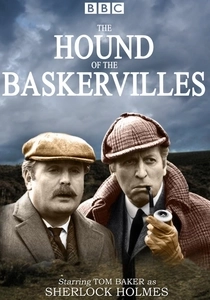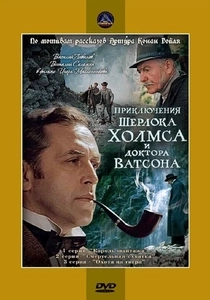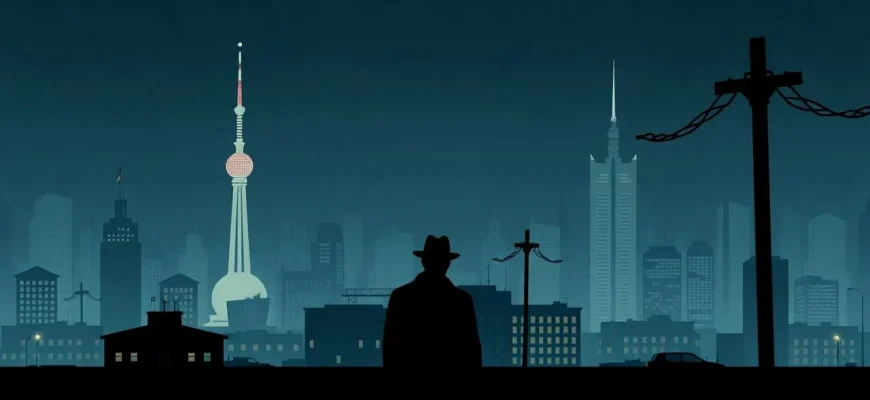- The Hound of the Baskervilles (1981)
- The Adventures of Sherlock Holmes and Dr. Watson (1980)
- The Meeting Place Cannot Be Changed (1979)
- The Criminal Quartet (1989)
- The Return of Sherlock Holmes (1987)
- The Hound of the Baskervilles (1971)
- The Case of the Three-Eyed Man (1983)
- The Black Triangle (1981)
- The Dead Season (1968)
- The Iron Heel of Oligarchy (1999)
Soviet cinema has always had a knack for weaving intricate tales of crime and suspense, often reflecting the societal tensions of the time. This curated list of 10 Soviet films delves into the dark world of murder, mystery, and the relentless pursuit of justice. From psychological thrillers to detective stories, these films provide a fascinating look at how murder was portrayed in Soviet cinema, offering both entertainment and a glimpse into the cultural psyche of the era.

The Hound of the Baskervilles (1981)
Description: This Soviet adaptation of Sir Arthur Conan Doyle's classic tale brings Sherlock Holmes to the screen in a chilling investigation of the Baskerville family curse. It's included for its unique Soviet interpretation of a murder mystery.
Fact: This film was one of the first Soviet adaptations of Sherlock Holmes, and it was well-received for its atmospheric setting and faithful adaptation.
 Watch Now
Watch Now 
The Adventures of Sherlock Holmes and Dr. Watson (1980)
Description: A series of films featuring the famous detective, this entry focuses on "The Speckled Band," where Holmes solves a murder with his keen observation and deduction skills.
Fact: The series was so popular that it led to several sequels, and the portrayal of Holmes by Vasily Livanov is considered one of the best.
 30 Days Free
30 Days Free 
The Meeting Place Cannot Be Changed (1979)
Description: Although primarily a crime drama, this series includes elements of murder mystery as the protagonist, Sharapov, investigates various crimes in post-war Moscow.
Fact: This TV series became a cultural phenomenon in the Soviet Union, with its catchphrases becoming part of everyday language.
 30 Days Free
30 Days Free 
The Criminal Quartet (1989)
Description: A detective film where four seemingly unrelated murders are linked by a common thread, showcasing the complexity of Soviet crime narratives.
Fact: The film was one of the last major Soviet detective films before the dissolution of the USSR.
 30 Days Free
30 Days Free 
The Return of Sherlock Holmes (1987)
Description: Another installment in the Soviet Holmes series, this film includes "The Empty House," where Holmes returns to solve a murder that baffled everyone during his absence.
Fact: This film marked the return of Holmes after his supposed death, showcasing the enduring popularity of the character in Soviet culture.
 30 Days Free
30 Days Free 
The Hound of the Baskervilles (1971)
Description: An earlier adaptation of the same story, this film captures the eerie atmosphere of Dartmoor and the mysterious death surrounding the Baskerville family.
Fact: This version was directed by Igor Maslennikov, who later directed the more famous 1980s series.
 30 Days Free
30 Days Free 
The Case of the Three-Eyed Man (1983)
Description: A Soviet detective film where a detective investigates a series of murders linked to a mysterious figure known as the "Three-Eyed Man."
Fact: This film was part of a series of detective stories that were popular in the Soviet Union, showcasing the genre's appeal.
 30 Days Free
30 Days Free 
The Black Triangle (1981)
Description: A detective story involving a series of murders connected to a secret society, this film explores themes of espionage and political intrigue.
Fact: The film was based on a novel by Arkady and Georgy Vainer, who were known for their crime fiction.
 30 Days Free
30 Days Free 
The Dead Season (1968)
Description: While not strictly a murder mystery, this film involves a Soviet agent investigating a series of mysterious deaths in a foreign country, blending espionage with crime elements.
Fact: The film was directed by Savva Kulish, known for his work in the thriller genre.
 30 Days Free
30 Days Free 
The Iron Heel of Oligarchy (1999)
Description: A post-Soviet film that delves into the dark world of organized crime, murder, and corruption, reflecting the changing times in Russia.
Fact: This film was one of the first to openly address the rise of oligarchs and the criminal underworld in post-Soviet Russia.
 30 Days Free
30 Days Free 








